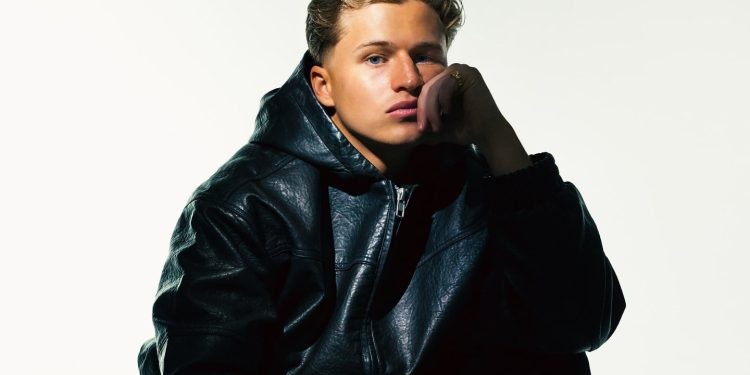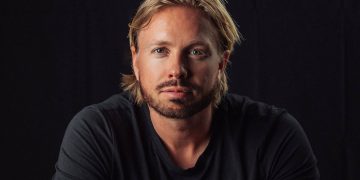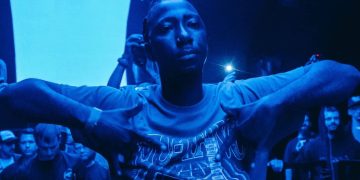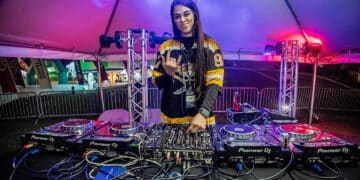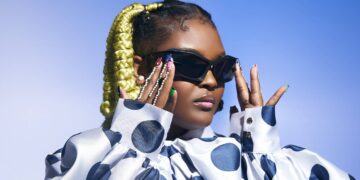We spoke with Skiis at Portola Festival about his roots, the harder sounds that define his sets, community in the city’s underground scene, and his soft launch project.
Portola Festival has been a stomping ground for rising talent in electronic and dance music, but this year marked a particularly special milestone for San Francisco-based artist Skiis. Throwing down at after parties for the past few years, 2025 was his first time opening Portola’s Pier Stage, and for Skiis, it wasn’t just a gig. It was home.
“It was fucking sweet,” he said just hours after his debut. “All the anticipation and stress leading up to it was communal; me, my team, my friends, we all felt it. Then I looked out into the crowd and saw many familiar faces, including people who had flown back to SF just to be there, holding signs with my face on them. It made it really easy.”
Familiar with more dark, intimate spaces built around the local community, being under the bright sun at 1:30pm on a Sunday brought a different kind of energy for the Mexican-born artist. It also marked a new level of achievement in his fast-growing career.
Born in Veracruz, Mexico, and raised in the US from the age of seven, Skiis has a unique association with Spanish music. However, as he grew older, his appreciation and understanding of his roots deepened. Now, he finds ways to mix those influences into his dance music sets, while combining the harder, four-on-the-floor beats that he developed a passion for during the pandemic. That passion now pulses through his sets and productions, bringing moody and melodic elements with high-octane power to the dancefloor.
We spoke with Skiis at Portola Festival about his roots, the harder sounds that define his sets, community in the city’s underground scene, and his additional project soft launch. Listen to his most recent release, “TAKE OFF !!,” featuring Clearcast on Spotify, and keep reading for our interview with him.
Since you’re usually rooted in the underground—community events, smaller or more unique spaces—how did the energy at Portola compare? And did playing during the day add a different layer to that experience?
Before I can talk about my own experience, I was here yesterday and went backstage to see Duke Dumont. That’s not someone I’m used to seeing live, but I grew up with his music. And watching what he was doing for that massive audience. It was like, oh, this is festival DJing. That’s something else entirely. It’s huge.
Obviously, I wasn’t playing peak time like him, but even here, my set was more planned out, like, what’s the vibe I’m trying to convey at this hour? I had to acknowledge I was first; people were walking in, vibing, chilling, smoking weed. But at the same time, I still got booked. So I’m gonna do my thing and set the tone.
So it was more about acknowledging the space, but also asking, “Can I get them going?” Whereas if I’m playing a small back room I’ve played ten times, I just walk in with a bag of tracks, feel the energy, and make decisions on the fly.
Talk to us about your journey with music. Before you found yourself in clubs or behind decks in San Francisco, what role did music play in your life growing up in Mexico?
I came to the US when I was seven. I was born in Veracruz, spent my early childhood there, and then immigrated. I grew up with my mom, so my first connection to Spanish music was Mexican pop, and it wasn’t actually positive at first *laughs*. It would be, like, Saturday morning, 7 AM, Mexican music blasting in the living room, like Vicente Fernandez, and for a long time, I associated it with cleaning.
As I got older, like everyone, I started loving my identity and background more. You realize “this is what makes me, me.” So now I reach back into that bag of music (indie, boricua, dembow) and explore how to connect it with house, breakbeat, techno. Not making it about just that because I’m more than being Mexican, but letting it show through naturally.
I’ve met two of my favorite artists in the underground scene out of Mexico, DJ Fuchi and 11010, who’ve been huge inspirations. 11010, especially the way he blends dembow, salsa, jungle, it was huge for me. We hosted him with my collective Vitamin 1000 in San Francisco, and staying connected, seeing someone from Veracruz do that, it felt inspiring and meaningful.
I’m not saying I make it all about that, but sometimes you select certain tracks, and people with a similar background will be like “fuck yeah!” It’s prideful, it’s meaningful.
What led you to lean into the harder sounds of dance music, and when did you realize that they were your form of creative expression?
Around 2020. In my early adulthood, I was into house music, going to warehouse parties in LA, like, off-the-grid raves. But during the pandemic, everyone was pent up. I started discovering harder music from the UK and Australia. Mall Grab, especially his Sunflower EP, changed everything for me.
The first time I heard it, I hated it. But by the third listen, I was like, wait, this is sick. Lo-fi, emotional. I also listened to Crystal Castles when I was really young because of my brother, and there are these weird, like, crushed, 8-bit synths, really moody sounds. And it’s also hard dance music, but it’s super moody. It opened a wormhole.
Then, Steel City Dance Discs and Australian artists like X Club and Suna Skin are all huge influences. So when things opened up again, I was itching to play this stuff. And by chance, I met all the right people in San Francisco who let me.
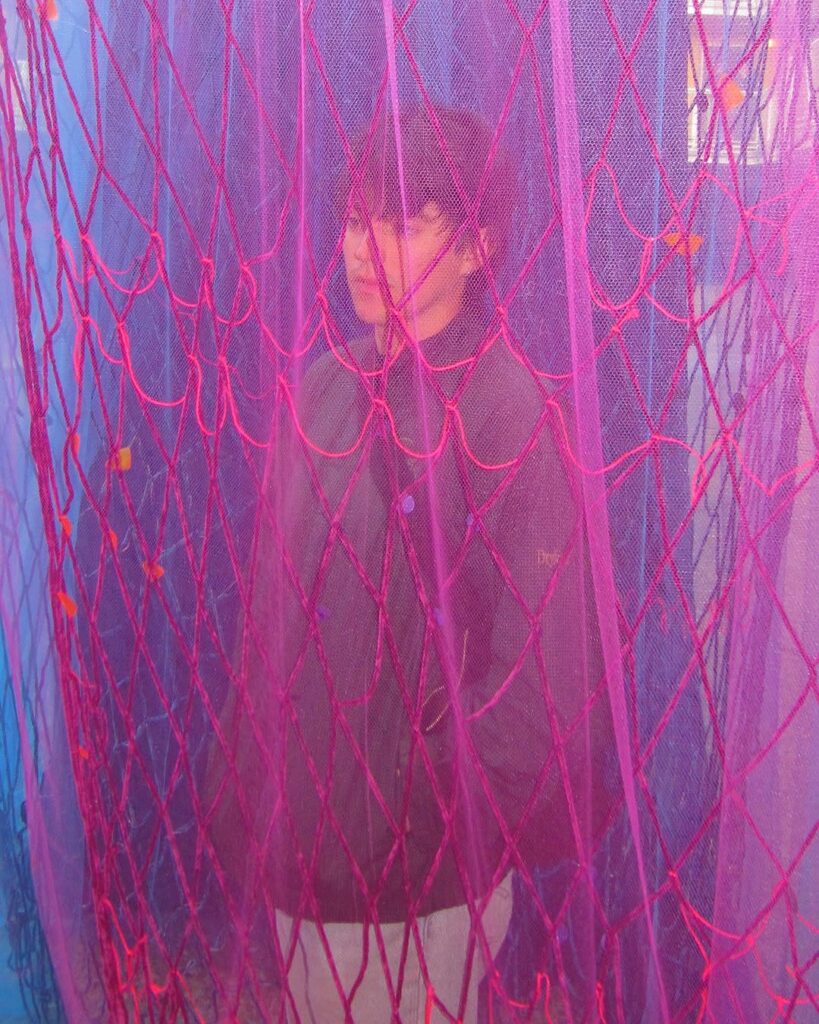
San Francisco has such a rich underground dance scene… What has it been like building yourself up in that environment, and how do you see your role in pushing the culture forward on a local level?
Honestly, it’s felt weirdly easy. Compared to New York or LA, SF isn’t cutthroat. It’s a small-big city, and people know if someone’s throwing a party in a similar lane, it pushes the whole scene forward.
When I started going out, everyone knew each other and supported each other. When I started being more active with Vitamin1000, I realized half the crowd at our parties were people who’d also hosted parties I went to. It’s very reciprocal.
Every event feels like another occasion to celebrate each other. Someone released an EP, someone started a label. Everyone keeps an ear out; it’s never felt unnatural or unwelcoming.
You have another project called soft launch with local artist Clearcast. What makes the project different from what you do solo? How do you approach soft launch vs Skiis?
soft launch is me and my best friend Frankie, who goes by Clearcast. Frankie is one of the most talented producers in The Bay, no doubt. We both attended UC Santa Cruz, didn’t know each other then, but reconnected in the scene after the pandemic.
We had immediate chemistry although our sounds are different. Frankie leans UK bass, glitchy, PC music; I lean break-y house, techno, dembow. But when we meet in the middle, it’s magic. We also agreed not to overdo it. People wanted to book soft launch everywhere after our first set, but we decided to keep it special. We’re both still individual artists, but when we choose to play together, it’s exclusive and explosive.
We’ve made tracks before, but our first official release was Saltwater, through Vitamin1000 Recordings. It felt right. It reflected our friendship and what the project means.
As an artist carving your path in the underground scene, what’s a lesson you’ve learned that you think would be valuable for other up-and-coming artists?
Stay true to why you’re doing it. During the pandemic, it was easier; we all just focused on the music. Coming out of it, it became more social, sometimes even performative.
But I try to remind myself, “Am I here because I love this? Or just to be seen?” If you approach others genuinely, relationships and collaborations come naturally. And those are everything.
I wouldn’t be where I am without collabs and friendships. Half the tracks I played today were either mine, a friend’s, or collabs. I play them because I love them, not just because they’re “hot.” It’s about remembering why you do this and that makes everything meaningful.



